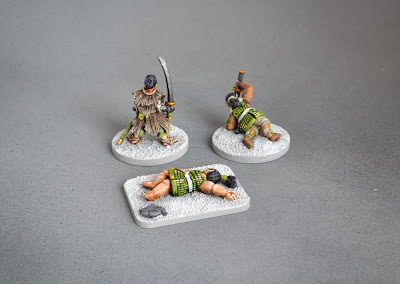"Nobody likes the House of Chaya. Their nobility is bought through wealth and their signature is greed.
They are wealthy, proud and ambitious. Their sharp-elbowed advance along the coast of northern Honshu, gathering lands and castles, has created many enemies. One clan, the Akiyama, has become the most recent victim of Lord Chaya Ichiro’s schemes of aggrandisement. But now, Lord Akiyama is dead.
Two days ago, Lord Akiyama was dishonourably killed by Chaya no Irosuke, a notorious samurai of the House of Chaya. Worst of all, Lord Akiyama’s legendary sword was taken from his dead hands and was brought to the Chaya’s ancestral temple to be re-consecrated as a trophy of the Chaya’s conquests."
********
Everyone loves a villain. And, as one famous actor has said, “Every villain is a hero in their own mind.”
In creating tabletop miniatures games at games days and wargame shows, I always find it helps to try and set the theme. Part of that is describing what the players are fighting for. What are the stakes? Which side are you on? It’s easy with history. Everyone, and I mean everyone, knows it’s OK to punch a Nazi.
But with games which involve a more alt-history, or a down-right fantasy feel, it’s harder. Of course, sometimes it's made easy by the bad guys wearing black, or carrying a red light-sabre. Other times, it helps for me to tell the players, in as few words as possible, which side they’re fighting on.
And so to The House of Chaya.
Put simply, they’re villains. Nobles, for sure. Wealthy, of course. Darkly handsome in a Kylo Ren kind of way? - well, maybe you can make your mind up on that one. But they’re the bad guys? Yes, they are. Because every story needs a villain.
More seriously, I’ve found that wargames with a smaller footprint (in terms of game size and playing time) need a helping hand. You can have an attractive table, and thematic rules. But the importance of the background story, or the “skinny” as American TV writers might call it, increases as the table shrinks. The figures and the terrain can’t do it all on their own.
And in that environment, it helps for there to be a villain. Someone you can point to as the bad guys. Maybe they “killed our ‘Pa”. Maybe they burned your farm. Maybe they took your sacred sword.
Or maybe they did all three.
It short circuits the long gaming background of where you are and why you’re fighting. Because as Indiana Jones says, it's always OK to punch a Nazi.
Or clash swords with the Chaya.
I've been carrying the representatives of the House of Chaya up and down the United Kingdom for the past year and a half to serve as the bad guys in our games of "When the Last Sword is Drawn". These are the latest additions to the usual suspects. Including the heart-throb of the House of Chaya - Chaya no Irosuke.
These are some more of the figures from the glorious samurai- and Japan-fixated 1980s. The two fallen fighters are from Dixon Miniatures’ early samurai range. The mounted samurai is from the same range. He’s advertised as a famous samurai commander from the 13th Century.
But he’s such a lovely figure that it’s a shame to limit him to that period. I strung his bow string with fine wire, and pinned the bow to his hand at the start of painting. I also glued him to his horse. It would, however, have been easier to paint horse, rider and bow separately, and assemble afterwards. It was a hard choice, and I might do it differently next time.
The remaining figure is a Games Workshop samurai retainer from the 1984 “Oriental Heroes” range. He’s a lovely, flexible, figure who could serve as a retainer, or a samurai without armour. I love the confident pose, the larger than normal (almost comic-book) katana, and the wicker rain cape. He’s got a swagger about him, which the mounted samurai shares. And, after all, who doesn't love a villain with a little bit of sass?
I also felt the Chaya needed a uniting theme. I chose a colour for their House. Green, the colour of confidence, green tea, lush (almost-certainly stolen) farmland, and jealousy. I tried to make it a signature of the House of Chaya. Almost so that you know when to boo when they enter the stage.
And because all the factions in "When the Last Sword is Drawn" have some traits and attributes (not all of which are helpful), here's the ones we've been using for the Chaya on the tabletop, updated for some of the new members of the household. And, of course, a ludicrously indulgent character-card for Chaya no Irosuke himself:
More from the wintry coast of northern Honshu next time, dear readers.
********













Very nicely painted models. Very clean and clear. I really enjoy your back story on these. You nailed the quick and easy, "Yup. I hate them" vibe you were going for.
ReplyDeleteThank you! They're villains, for sure!
DeleteGreat work Sidney, nice to see you active in the Blogosphere again. All the best Airhead
ReplyDeleteThanks Airhead! Great to hear from you and thanks for dropping by!
DeleteClassic figures with lovely paintjobs. Outstanding again.
ReplyDeleteThanks very much indeed, Andy!
DeleteVery fine brushwork there! Those Dixon figures take me right back to the 1980's with memories of our own Samurai exploits. In one game my Lord slipped on a log bridge over a stream and drowned on a double one!
ReplyDeleteThanks for dropping by, David! Those are exactly the great memories I'm hoping to rekindle !!
DeleteJust stunning! I love this palette and beautifully executed.
ReplyDeleteThanks very much indeed, Michael!
DeleteLovely work Sidney…
ReplyDeleteAll the best. Aly
Thanks very much indeed, Aly!!
DeleteThis project has exploded! Well done mate on some exciting work
ReplyDeleteExploded in a good way, I hope! Thanks for dropping by!
Delete